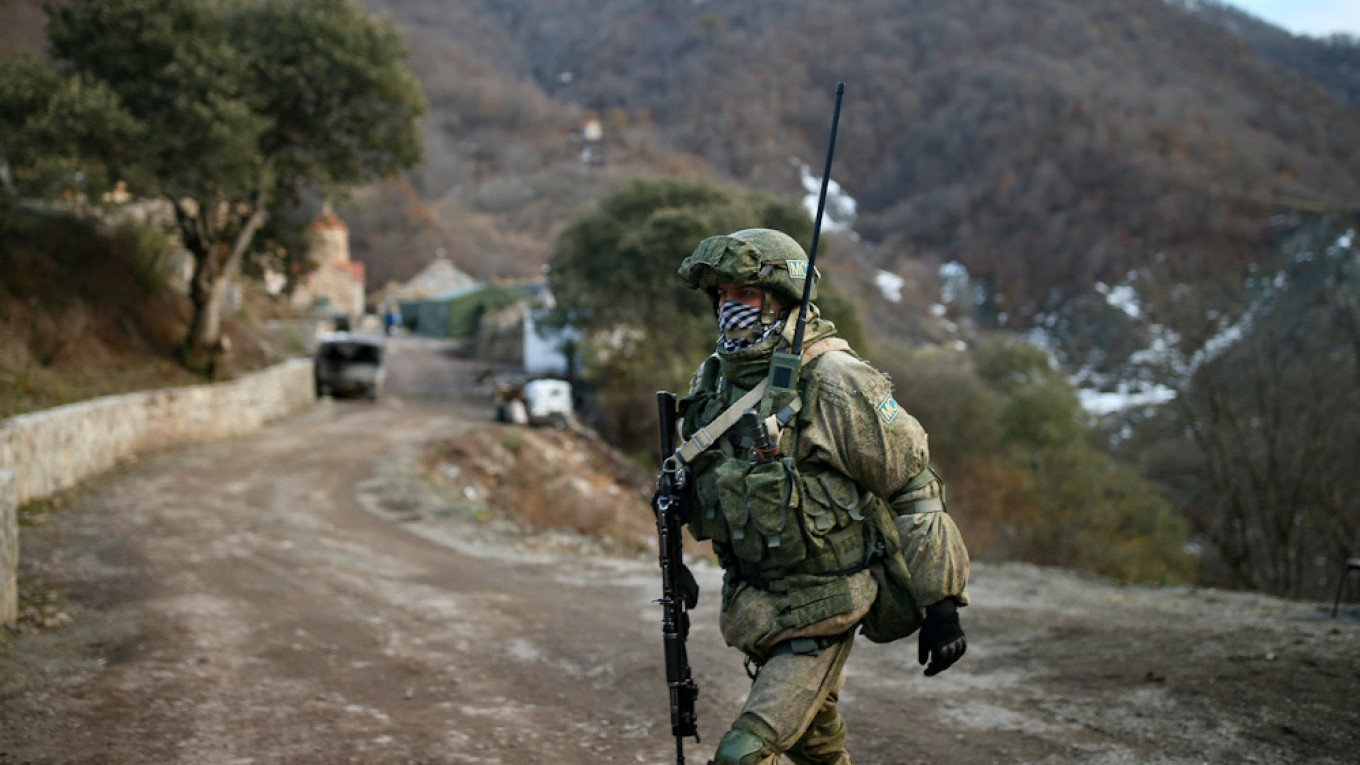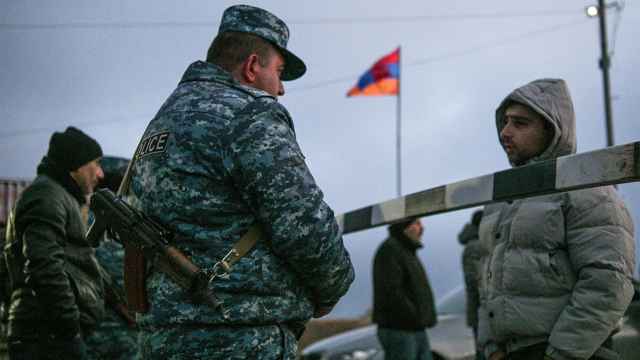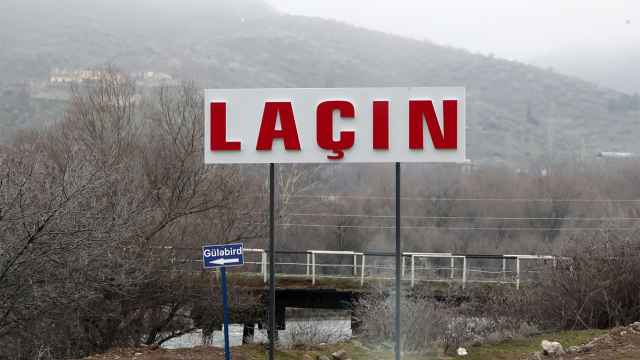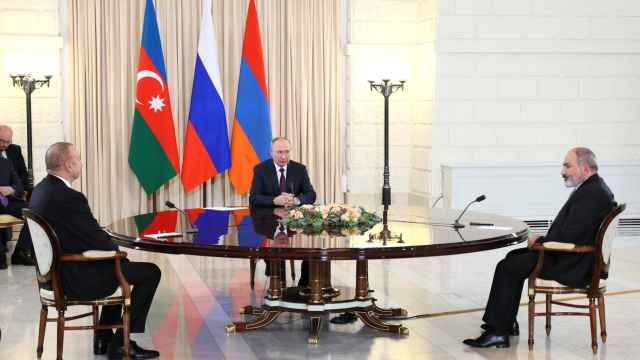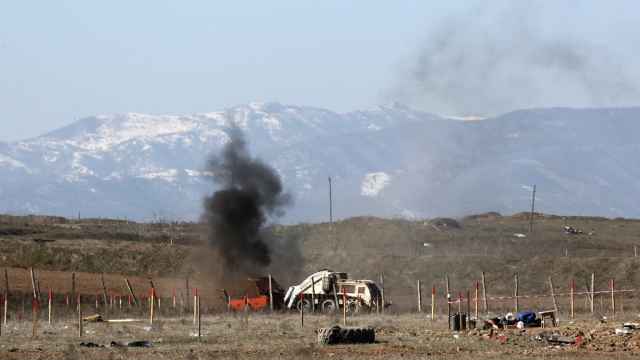Azerbaijani forces advanced significantly into territory along the border with Armenia this week, sparking a security crisis in which Russia — Armenia’s treaty ally and the broker of the ceasefire agreement between the two sides — has taken a conspicuously passive role.
The details of precisely what happened remain unclear, but Armenia says that Azerbaijani forces on May 12 advanced up to 3.5 kilometers toward Armenia from their previous positions and crossed Armenia’s border. Azerbaijan responded with a statement that was delicate in its vagueness, acknowledging the advance but eliding the question of whether its forces crossed the border.
Whatever happened, though, it caught the world’s attention. The U.S. State Department issued a statement noting concern over “increased tensions along a non-demarcated portion of the Armenia-Azerbaijan border,” urging “restraint in de-escalating the situation peacefully.”
France went farther; President Emmanuel Macron tweeted: “Azerbaijani armed forces have crossed into Armenian territory. They must withdraw immediately. I say again to the Armenian people: France stands with you in solidarity and will continue to do so.”
But the key power broker these days is Russia, which is a co-signer of the ceasefire agreement that ended last year’s war and which has deployed a 2,000-strong peacekeeping mission to the region. And thus far its response has been muted.
Armenia formally appealed to the Collective Security Treaty Organization, the Russia-led political-military bloc that obliges member states to protect one another from external attack. The organization responded with a statement saying it was “closely following the developing situation” and that “as the situation develops, if necessary, actions will be taken as stipulated in the collective security agreement.”
Russian officials, meanwhile, have been even more passive. Foreign Minister Sergey Lavrov — who had visited Yerevan and Baku in the last week — spoke with his counterparts in both countries to discuss the situation.
“The importance of resolving all these sorts of incidents by exclusively political-diplomatic methods was noted,” the Russian MFA said in a statement following Lavrov’s talk with Armenian Foreign Minister Ara Ayvazyan. “Readiness to offer full support for the normalization of the situation in the South Caucasus was expressed.”
Russia’s modest response stood in contrast to the aggressive — and thus far unexplained — Azerbaijani advance. So what is Azerbaijan up to?
The story began on the morning of May 12, when reports emerged from local officials in and around Goris, in Armenia’s southern Syunik region. The reports — which were quickly debunked — claimed that there had been violent clashes between the two sides following an Azerbaijani assault and that Armenian soldiers had been wounded. Officials in Yerevan were slow to respond and in the information vacuum, panic spread on Armenian social networks.
Ever since the war ended last November, Syunik has been the site of tension as Azerbaijani soldiers have taken up new positions in territory that they rewon during the war. That has brought them into close proximity with Armenian towns and roads, intimidating locals. Azerbaijani officials, starting from President Ilham Aliyev, have been fanning the flames by repeatedly arguing that Syunik — which they refer to using another name, Zangezur — is “historical Azerbaijani territory” and hinting at irredentist ambitions there.
Amid this heightened tension, news of troop movements led many Armenians to fear the worst. And that may have been Aliyev’s goal, said Richard Giragosian, the director of the Yerevan think tank Regional Studies Center.
“Just as with the sometimes exaggerated threat perception regarding Turkey, now the concern stems from Azerbaijan wanting Zangezur/Syunik. But Aliyev, on purpose, is contributing to this, he’s exacerbating it,” Giragosian told Eurasianet.
“There is less danger of an outright Turkish invasion, but there is a sense that Azerbaijan is seeking more territory from Armenia proper. But it’s bluff and bluster and perception in Armenia matters as much as reality, and conspiracy theories are king.”
Finally, late in the evening, Armenian Prime Minister Nikol Pashinyan addressed the issue following an emergency meeting of the National Security Council.
“Earlier today Azerbaijan’s armed forces crossed the state border of the Republic of Armenia and advanced as far as 3.5 kilometers in that section. In fact, they are trying to surround and siege [Sev] Lake,” a body of water that lies in the border region, Pashinyan said. But he added that Armenian forces were able to stop the advance without any shots being fired.
Technically, there is no state border between Armenia and Azerbaijan, as the two sides never came to a formal agreement on the delineation following their independence on the collapse of the Soviet Union. The demarcation process has been given a new impetus following the end of the war last year, albeit outside the view of the public.
But the basis for the demarcation is Soviet maps from the pre-independence times, and while those maps were not meant to strictly delineate an international border, they do all appear to show that most of Sev Lake is in Armenian territory, which would mean an attempt to surround it would be an infiltration.
“They are trying to justify their move with some fake maps,” Pashinyan said. “We still have in our possession a map approved by the central government in the Soviet era, which clearly shows where the border between Armenia and Azerbaijan runs.”
The next day, Azerbaijan’s MFA responded, saying that due to improving weather this spring, Azerbaijani border forces deployed “in the positions of our country.” It also addressed the ongoing demarcation process, arguing curiously that there has been no agreement yet on the border but nevertheless stating categorically that everything it does is in Azerbaijani territory.
“Measures to strengthen the border protection system implemented within the territorial integrity of Azerbaijan are carried out on the basis of maps available to each of the sides that define the border line between Armenia and Azerbaijan,” the statement said.
“Since regaining its independence, there has been no state border between the two countries for obvious reasons, and for this reason we speak about the complicated technical process, which is currently accompanied by disagreements between the sides.”
The Azerbaijan MFA statement also said that its border forces were negotiating on the spot with their Armenian counterparts, and Armenians confirmed that. Russian peacekeepers were also reported to be involved in the negotiations.
Many analysts have noted that the Azerbaijanis appeared to have faced little resistance as they advanced.
Russia has recently been expanding its military presence into Syunik, setting up two new “strongholds,” to use Pashinyan’s words, as part of the 102nd military base that Russia has long operated in Gyumri, on the other end of the country. As the Russian presence has increased there, Armenia has withdrawn military forces and replaced them with “paramilitary border guard units from the National Security Service instead,” Giragosian said.
“Although this was designed to de-escalate the tension and risk inherent form the close proximity of recently advanced Azerbaijani military units, Azerbaijan is clearly taking advantage of this, sensing weakness and is testing both Armenia and Russia to respond,” he said.
“Yet the overall situation is critical, and in any other country, how could a foreign armed force advance for three kilometers across a country’s frontier unchallenged? Just on principle, it’s shocking.”
Azerbaijan may have been motivated given its strategic position including a 3,500-meter height, known as Mets Ishkhansar.
“This is a commanding height, completely controlling the Sisian airport and the road from Saravan to Goris and onward to Kapan,” the former chief of general staff of the Armenian armed forces, Movses Hakobyan, told the local news site news.am. “The loss of this height is fraught with dangerous consequences.”
Its motivations could also be political.
“It’s like how before the war, Pashinyan declared that ‘Karabakh is Armenia’ and Aliyev declared that ‘Karabakh is Azerbaijan.’ From this, we’re getting the statements about Zangezur being Azerbaijani,” said Mehman Aliyev, the director of the Azerbaijani news agency Turan, in an interview with Caucasian Knot.
“This is a purely political statement, and Aliyev is doing it for the same reason that Pashinyan did – to irritate his adversary and raise the stakes in future negotiations over Karabakh. It’s a means of pressure on Armenia.”
The advance took place at a curious time, just the day after Lavrov was in Baku and met with Aliyev. That suggested that the move either had Moscow’s blessing, or that Aliyev is confident enough in his strong hand that he could push the issue without incurring the Kremlin’s wrath. His casual attitude was demonstrated by the fact that, the day all of this started, he was in Shusha attending a music festival — and wasn’t even wearing camouflage.
Pashinyan spoke with Russian President Vladimir Putin late in the evening on May 13 — “at the initiative of the Armenian side,” the Kremlin release noted — and Putin “emphasized the need to strictly fulfill all of the provisions of the [ceasefire statement], especially the strict adherence to the ceasefire regime.” There have been no reports of a Putin-Aliyev conversation since the crisis began.
For Russia, the crisis “holds both peril and promise,” Giragosian said.
“The peril stems from Azerbaijan's open defiance and overt determination to challenge the Russian-imposed ceasefire agreement while effectively testing both Armenian resolve and Russian response. In this new post-war context, Azerbaijan can be expected to only continue its probing of weakness, with such incursions and escalations used as leverage for a new forward-leaning posture,” he said.
But, he added, “it is precisely this scenario that presents an opportunity for Moscow to further expand its control of Armenia's external borders, possibly making the Armenian-Azerbaijan border areas the latest additions to the Russian presence in Armenia.”
A Message from The Moscow Times:
Dear readers,
We are facing unprecedented challenges. Russia's Prosecutor General's Office has designated The Moscow Times as an "undesirable" organization, criminalizing our work and putting our staff at risk of prosecution. This follows our earlier unjust labeling as a "foreign agent."
These actions are direct attempts to silence independent journalism in Russia. The authorities claim our work "discredits the decisions of the Russian leadership." We see things differently: we strive to provide accurate, unbiased reporting on Russia.
We, the journalists of The Moscow Times, refuse to be silenced. But to continue our work, we need your help.
Your support, no matter how small, makes a world of difference. If you can, please support us monthly starting from just $2. It's quick to set up, and every contribution makes a significant impact.
By supporting The Moscow Times, you're defending open, independent journalism in the face of repression. Thank you for standing with us.
Remind me later.


